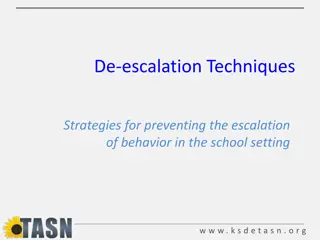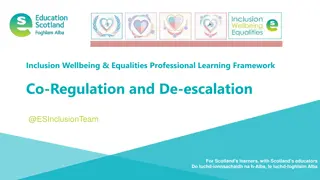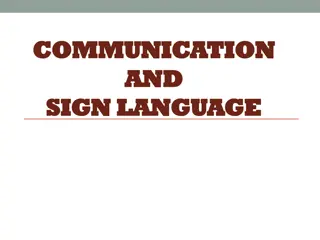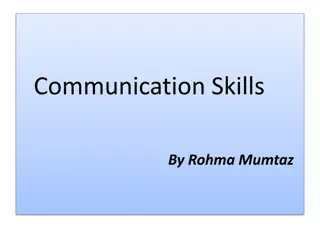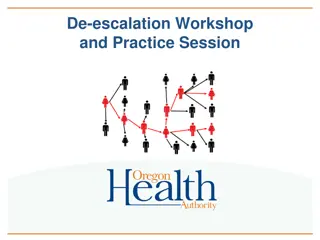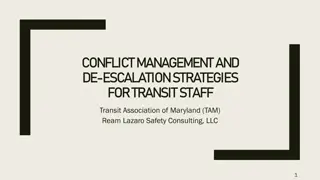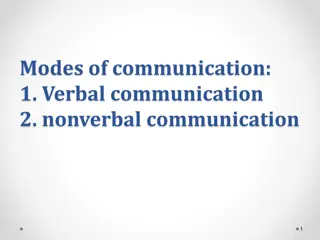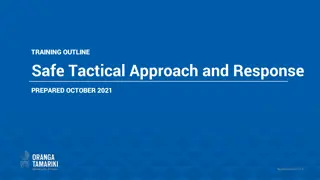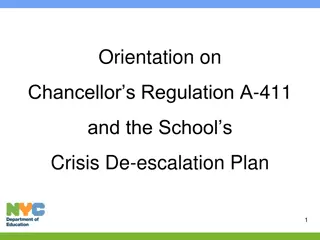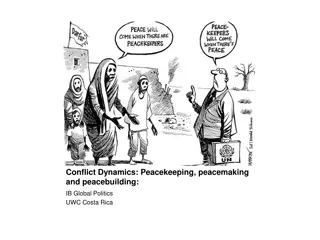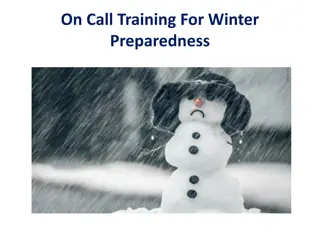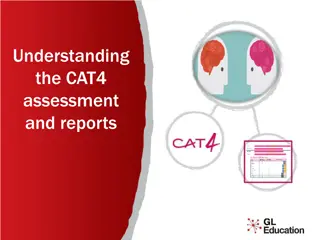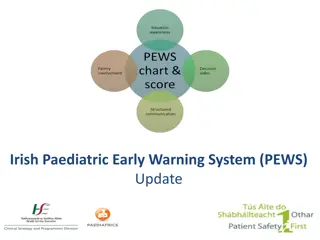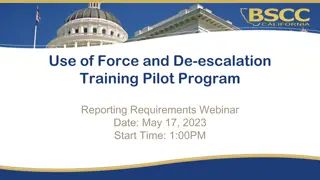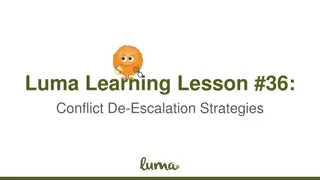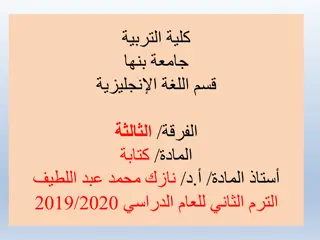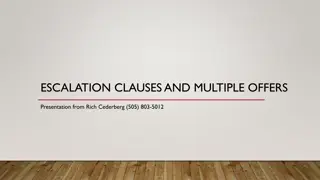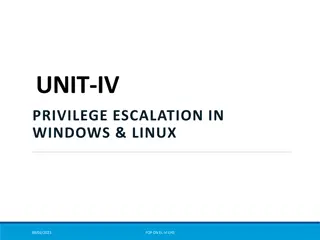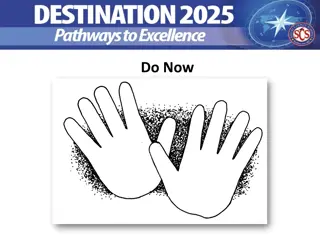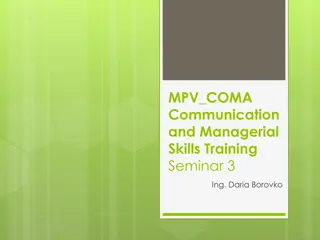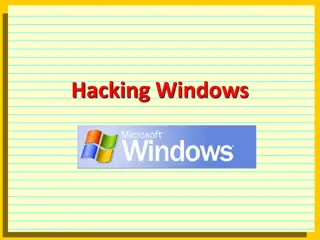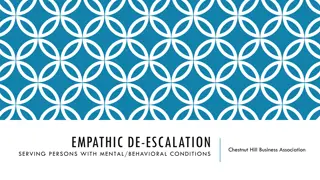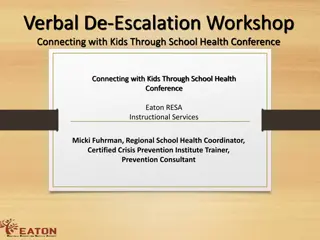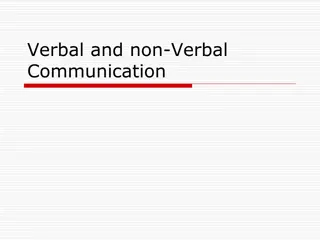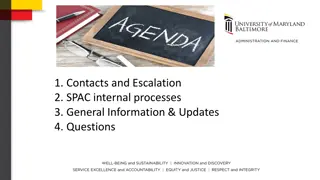Understanding Communication Styles and Advantages of Written Communication
Communication is the process of sharing information through various mediums like verbal, non-verbal, written, and visual. Understanding the communication cycle and different styles - verbal, non-verbal, visual, and written - is crucial for effective communication. Written communication offers advant
9 views • 22 slides
Effective De-escalation Techniques for School Settings
Explore strategies and techniques for preventing behavior escalation in schools based on the work of experts like Dr. Geoff Colvin and Dr. George Sugai. Understand the importance of managing disruptive behaviors, proactive interventions, and stages of escalating behavior. Discover how to become flue
1 views • 52 slides
Scotland's Professional Learning Framework: Co-Regulation and De-escalation
This professional learning framework focuses on co-regulation and de-escalation strategies for Scotland's educators to enhance the well-being and inclusion of Scotland's learners. It includes resources for facilitating group or self-directed learning activities, emphasizing the importance of creatin
1 views • 39 slides
Clinical Escalation: Building Effective Communication in Maternity Units
Exploring the importance of clinical escalation in maternity units, this session outlines the components and practices involved in identifying, communicating, and acting upon clinical concerns. It emphasizes recognizing deviation from normality, effective communication, and taking appropriate action
0 views • 27 slides
Understanding Verbal Prescriptions in Pharmacy Practice
This comprehensive guide provides insights into obtaining verbal prescriptions, necessary information in a verbal prescription, types of written verbal prescriptions, acceptable sources for verbal prescriptions, authorized personnel to accept verbal prescriptions, laws regarding interns and verbal p
0 views • 18 slides
Understanding Communication and Sign Language
Communication is the vital process of exchanging information, ideas, and emotions through various channels such as speech, signals, and writing. This includes verbal and non-verbal communication, where sign language plays a crucial role. Effective communication depends on the sender, message, channe
1 views • 31 slides
Understanding Communication Skills and Types
Communication is the exchange of information through various mediums like speaking and writing. It can be verbal or non-verbal. Verbal communication involves oral and written forms, while non-verbal communication includes body language and appearance. Each type has its own advantages and drawbacks,
1 views • 13 slides
De-escalation Workshop and Practice Session Overview
This overview provides insights into a De-escalation Workshop and Practice Session, emphasizing the importance of video and microphone usage, the commitment of the CRRU Training Team, workshop topics, and strategies for building rapid rapport. It also discusses common concerns and pushback faced in
0 views • 25 slides
Understanding Verbal and Non-Verbal Tests
Verbal and non-verbal tests serve different purposes in assessing intelligence and skills. Non-verbal tests utilize images and diagrams to measure reasoning abilities without requiring reading or writing. Verbal tests, on the other hand, assess language-based skills through reading, writing, or oral
0 views • 14 slides
Conflict Management and De-escalation Strategies for Transit Staff
This presentation by the Transit Association of Maryland (TAM) and Ream Lazaro Safety Consulting provides insights into the increasing assault injuries in transit since 2008, definitions of assault, assault types, contributing factors, basic needs of transit passengers, and passenger traits that may
0 views • 57 slides
Understanding Modes of Communication and Verbal Messages
Communication occurs through verbal and nonverbal modes, with messages having denotative and connotative meanings. Verbal messages vary in directness, affecting the effectiveness of communication. Indirect messages offer advantages such as politeness and avoiding offense, but can also lead to misund
0 views • 64 slides
Understanding the Importance of Nonverbal Communication in Communication Skills
Nonverbal communication plays a crucial role in conveying messages and signals through platforms like eye contact, facial expressions, gestures, posture, and spatial distance. It includes appearance, body language, silence, time, and space. This form of communication can significantly impact the rec
0 views • 16 slides
Understanding Irony in Verbal, Dramatic, and Situational Contexts
Explore the nuances of verbal, dramatic, and situational irony through examples and explanations. Verbal irony involves saying something different from what is meant, often using humor like puns. Dramatic irony occurs when the audience knows something the characters don't, creating suspense. Situati
0 views • 12 slides
Safe Tactical Approach and Response Training Outline
This training outline provides an overview of the structure, key topic areas, frameworks, and values of the Safe Tactical Approach and Response (STAR) training. It outlines the learning journey across five days, including theoretical training, defensive tactics, participant roleplays, and assessment
0 views • 10 slides
School Crisis De-escalation Strategies and Plans
Schools in New York City are committed to maintaining safe and orderly environments for effective teaching and learning. Establishing Crisis Intervention Teams and completing Crisis De-escalation Plans are essential. De-escalation strategies involve identifying crises, assessing strengths and weakne
0 views • 31 slides
Understanding Conflict Dynamics and Peace Processes
Explore the distinctions between peacekeeping, peacemaking, and peacebuilding in conflicts. Learn about conflict dynamics and the stages of escalation and de-escalation. Discover how these models guide responses and peace efforts, emphasizing the importance of long-term peacebuilding for sustained r
0 views • 8 slides
Winter Preparedness Training for Strategic Leadership in Escalation Situations
The Winter Preparedness Training focuses on preparing executive leads and on-call managers to provide strategic leadership during extreme periods of escalation. The training covers roles and responsibilities, strengths and weaknesses, escalation processes, teleconference chairing skills, partner col
0 views • 20 slides
Understanding Privilege Escalation and Backdoor Installation in Cybersecurity
Privilege escalation allows unauthorized access to system resources, while backdoors enable persistent access for attackers. The attack scenario involves compromising a website to deploy malicious files, such as Remote Access Trojans, leading to potential system compromise.
0 views • 13 slides
Understanding the CAT4 Assessment and Reports
CAT4, the Cognitive Abilities Test Fourth Edition, assesses students' abilities in verbal, quantitative, non-verbal, and spatial reasoning. It distinguishes between ability and attainment testing and is used to identify academic potential, understand student thinking, determine support needs, highli
1 views • 15 slides
Irish Paediatric Early Warning System (PEWS) Update and Implementation Overview
Explore the latest updates on the Irish Paediatric Early Warning System (PEWS) including learning outcomes, aims, observation charts, key points, escalation guide, and response pathways. Understand the importance of clinical judgment, individualized assessment, and standardized communication for rec
0 views • 15 slides
Project Management Fees and Escalation Challenges Analysis
In the analysis of project management fees and escalation challenges, key findings include low fee percentages, inconsistent reporting practices, and high escalation rates. Proposals suggest revising fee structures, monitoring design/management fees, and addressing code and practice escalation. Reco
2 views • 12 slides
Data Governance Issue Assessment Process Overview
The data governance issue assessment process formalizes how data issues are resolved by identifying clear steps to resolution, assigning responsibilities, and ensuring proper documentation. Lead stewards, liaisons, committee members, and support personnel play key roles in this process, which includ
1 views • 12 slides
Use of Force and De-escalation Training Pilot Program Reporting
The Use of Force and De-escalation Training Pilot Program aims to enhance law enforcement training methods. Established under the 2022 Budget Act, it requires reporting on participant demographics, training details, incidents, expenditure, and satisfaction metrics. Reports include baseline, annual d
4 views • 15 slides
Effective Ways to Handle Escalation with Your Child
Explore top 10 do's and don'ts when dealing with escalation with your child, emphasizing on maintaining composure, positive communication, and effective de-escalation techniques to handle challenging situations constructively. Learn about common escalation patterns and practical strategies to diffus
0 views • 4 slides
Conflict De-Escalation: Strategies for Handling Workplace Conflicts
Learn effective conflict de-escalation strategies for handling workplace conflicts. Strategies include removal/walk away, calming yourself, checking voice and body language, being aware of surroundings, expressing empathy and understanding, and reflecting and regrouping for future resolution.
0 views • 7 slides
Effective De-escalation and Distraction Techniques for Children
De-escalation techniques focus on helping children manage overwhelming emotions. Strategies include acknowledging feelings, using distraction, and giving space. Avoid demanding, stay calm, respect personal space, and offer distractions. Knowing what your child likes and dislikes is key to effective
0 views • 6 slides
Variety of Verbal Analogy Questions and Practice Sets
Explore a variety of verbal analogy questions and practice sets focusing on different types of relationships between words. From number series to verbal classification, essential parts, analogies, artificial language, and more, these exercises aim to enhance your verbal reasoning skills and logic. L
0 views • 20 slides
Understanding Semantic Effects in Verbal Short-term Memory
Investigating the impact of semantic knowledge and similarity on verbal short-term memory, this study delves into how imageability of words influences recall. Key findings highlight the influence of semantic relatedness and the imageability effect on memory retention, shedding light on the mechanism
0 views • 47 slides
Understanding Escalation Clauses in Real Estate
An escalation clause, also known as an escalator, allows a home buyer to increase their offer if a competing offer is higher. This presentation explains the components of an escalation clause, how it works in multiple offer situations, and provides sample language for incorporating it into a real es
0 views • 8 slides
Understanding Verbal Irony and Tone Through Examples
Verbal irony is the expression of words conveying the opposite of their literal meaning. It is not the same as lying and is used to emphasize a point. Tone plays a crucial role in conveying irony, as it can affect how the message is perceived. Sarcasm, though related, has a negative agenda of mockin
0 views • 7 slides
Understanding Privilege Escalation in Windows and Linux Systems
Privilege escalation attacks are malicious tactics used by attackers to gain unauthorized access and elevated privileges in a system. These attacks exploit vulnerabilities in operating systems and web applications, allowing attackers to move deeper into a network to access high-value assets. This co
0 views • 28 slides
De-Escalation Strategies in Classroom Management
Learn effective de-escalation strategies to manage classroom behaviors using Love and Logic principles. Explore techniques to prevent explosive behaviors, understand verbal and non-verbal de-escalation methods, and create a proactive plan to address challenging situations. Discover the importance of
0 views • 34 slides
Conflict Resolution Strategies for Managing Natura 2000 Site Conflicts
When faced with conflict at a Natura 2000 site, understanding potential triggers and employing effective communication skills, both verbal and non-verbal, are crucial. This includes managing body language, using appropriate language, active listening, and considering various influences such as attit
0 views • 15 slides
Effective Sermon Delivery Techniques for Engaging Presentations
Enhance your sermon delivery skills with insights from Dr. Rick Griffith and Ken Davis on the importance of non-verbal communication, proper gestures, audience-oriented movements, and dressing appropriately. Learn how to communicate effectively through both verbal and non-verbal cues for impactful p
0 views • 26 slides
Mastering Non-Verbal Communication in Managerial Skills Training
Explore the intricacies of non-verbal communication, including body language, tone of voice, and facial expressions, in the context of managerial skills training. Learn to detect signs of lying, evaluate interest and criticism, and recognize attitudes such as boredom and defensiveness. Enhance your
0 views • 34 slides
Windows Security Overview and Best Practices
Windows operating system security overview focusing on preventing unauthorized access, privilege escalation, and password vulnerabilities. Includes countermeasures such as setting proper permissions, implementing strong passwords, and detecting vulnerabilities. Covering topics like remote password g
0 views • 6 slides
Empathic De-escalation for Handling Mental Health Issues in the Workplace
Reduce stigma around mental and behavioral health in the workplace through education. Understand behaviors as forms of communication and learn de-escalation techniques. Manage responses, establish rapport, and use non-judgmental approaches to address escalating situations effectively.
0 views • 9 slides
Verbal De-Escalation Techniques for Connecting with Kids at School Health Conference
This content highlights the importance of verbal de-escalation in connecting with kids through a school health conference, providing insights on crisis development models, handling anxiety, empathic listening, and dealing with defensive behavior. The workshop emphasizes building rapport and understa
0 views • 48 slides
Understanding Verbal and Non-Verbal Communication
Verbal communication involves both speaking and listening, with listening being equally essential. It can be classified into sympathetic and empathetic listening, each serving different purposes in understanding others' feelings. Sympathetic listening involves sharing emotions, while empathetic list
0 views • 52 slides
SPAC Internal Processes and Contact Information
This information covers SPAC internal processes related to collections, reporting, response time for issues, and escalation procedures. It also provides contact details for various SPAC teams, emphasizing email communication for faster resolutions. Additionally, it outlines the quarterly collections
0 views • 22 slides

